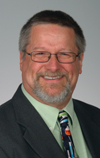|
By Roby Hill
South Caolina College of Pharmacy, MUSC campus
One of the nation's
leading cancer drug researchers has moved his work to South Carolina
thanks to the state's SmartState Program (previously known as the CoEE
Program).
 Patrick
Woster, Ph.D., is based at the S.C. College of Pharmacy (SCCP), where
he helps lead the Center of Economic Excellence in Cancer Drug
Discovery as the SmartState Endowed Chair in Medicinal Chemistry. Patrick
Woster, Ph.D., is based at the S.C. College of Pharmacy (SCCP), where
he helps lead the Center of Economic Excellence in Cancer Drug
Discovery as the SmartState Endowed Chair in Medicinal Chemistry.
Woster is one of four
endowed chairs supported by the Cancer Drug Discovery Center, an MUSC
center in which the University of South Carolina is a partner.
The SCCP has five endowed
chairs overall: Chuck Smith, Ph.D., (drug discovery), John Lemasters,
M.D., Ph.D., (cell injury, death and regeneration), Charles Bennett,
M.D., Ph.D., (medication safety and efficacy), Igor Roninson, Ph.D.,
(translational cancer therapeutics) and Woster (drug discovery).
"We are excited to have a
medicinal chemist of Dr. Woster's caliber join our drug discovery
team," said Rick Schnellmann, Ph.D., chair of the Department of
Pharmaceutical and Biomedical Sciences at SCCP.
Woster works to develop
drugs that turn specific genes on or off in tumor cells, a process
known as epigenetic modulation, that can make anti-tumor medications
more effective. In addition, he and his team work to discover new
treatments for diseases such as malaria and other parasitic illnesses.
According to Woster MUSC
has a goal of developing a world-class drug discovery program by
providing a core facility for drug synthesis and compound development,
and by teaming up with existing centers within the university, such as
Hollings Cancer Center. To date, Woster holds eight patents based on
compounds he has synthesized.
"The discovery of
successful, improved agents for the treatment of cancer would have a
significant impact on the lives of patients in South Carolina and
beyond," Woster explains. "We hope to increase the scope of our
research efforts to include many aspects of the drug development
process that will ultimately lead to early and late human clinical
trials."
Woster's work could have a notable impact on quality of life in South
Carolina by leading to improvements in both the physical well-being of
cancer patients and in the economic health of the state through the
creation of new companies and new job opportunities.
"Creating new intellectual
property is an important aspect of our work, and we hope to exploit the
commercial potential of our agents through association with or creation
of new companies within the state of South Carolina," he said. Woster
also notes that the compounds developed through his work could be "of
significant interest to large pharmaceutical firms, especially in the
current environment where alliances between industry and academia have
become much more common."
Woster's interest in
cancer drug research began during a clinical rotation in a hospital
oncology unit while in pharmacy school.
"I witnessed the fear and
confusion that patients experienced following a diagnosis of cancer,
and the frustration of the medical staff, who at that time had a very
limited arsenal of drugs for chemotherapy," said Woster. "Most of these
drugs had very serious side effects, and in many cases only prolonged
the life of the patient for a short time. These observations were major
motivating factors in my decision to train as a researcher."
Woster said he was drawn
to South Carolina because of the reputation of MUSC as an emerging
power in biomedical research, the outstanding reputation of SCCP, and
the state's SmartState Program, which provides an opportunity for
Woster to advance his research to the next level of excellence and
promote economic development in South Carolina.
"I've been impressed with
the collaborative environment that exists here," said Woster, who
arrived on campus March 1. "I've already seen lots of possible
opportunities to collaborate on new projects."
About
the SmartState Program
The South Carolina SmartState Program (previously known as the CoEE
Program) was created by the S.C. legislature in 2002 and is funded
through education lottery proceeds. The legislation authorizes the
state's three public research institutions, MUSC, Clemson University
and USC, to use state funds to create Centers of Economic Excellence in
research areas that will advance South Carolina's economy. Each Center
of Economic Excellence is awarded from $2 million to $5 million in
state lottery funds, which must be matched on a dollar-for-dollar basis
with non-state investment. To date, 49 centers have been created and 35
SmartState endowed chairs have been appointed to lead the centers. The
SmartState Program has resulted in more than $375 million in non-state
investment into the economy and is responsible for more than 4,700 jobs.
For more, visit http://www.SmartStateSC.org.
|



 Patrick
Woster, Ph.D., is based at the S.C. College of Pharmacy (SCCP), where
he helps lead the Center of Economic Excellence in Cancer Drug
Discovery as the SmartState Endowed Chair in Medicinal Chemistry.
Patrick
Woster, Ph.D., is based at the S.C. College of Pharmacy (SCCP), where
he helps lead the Center of Economic Excellence in Cancer Drug
Discovery as the SmartState Endowed Chair in Medicinal Chemistry.